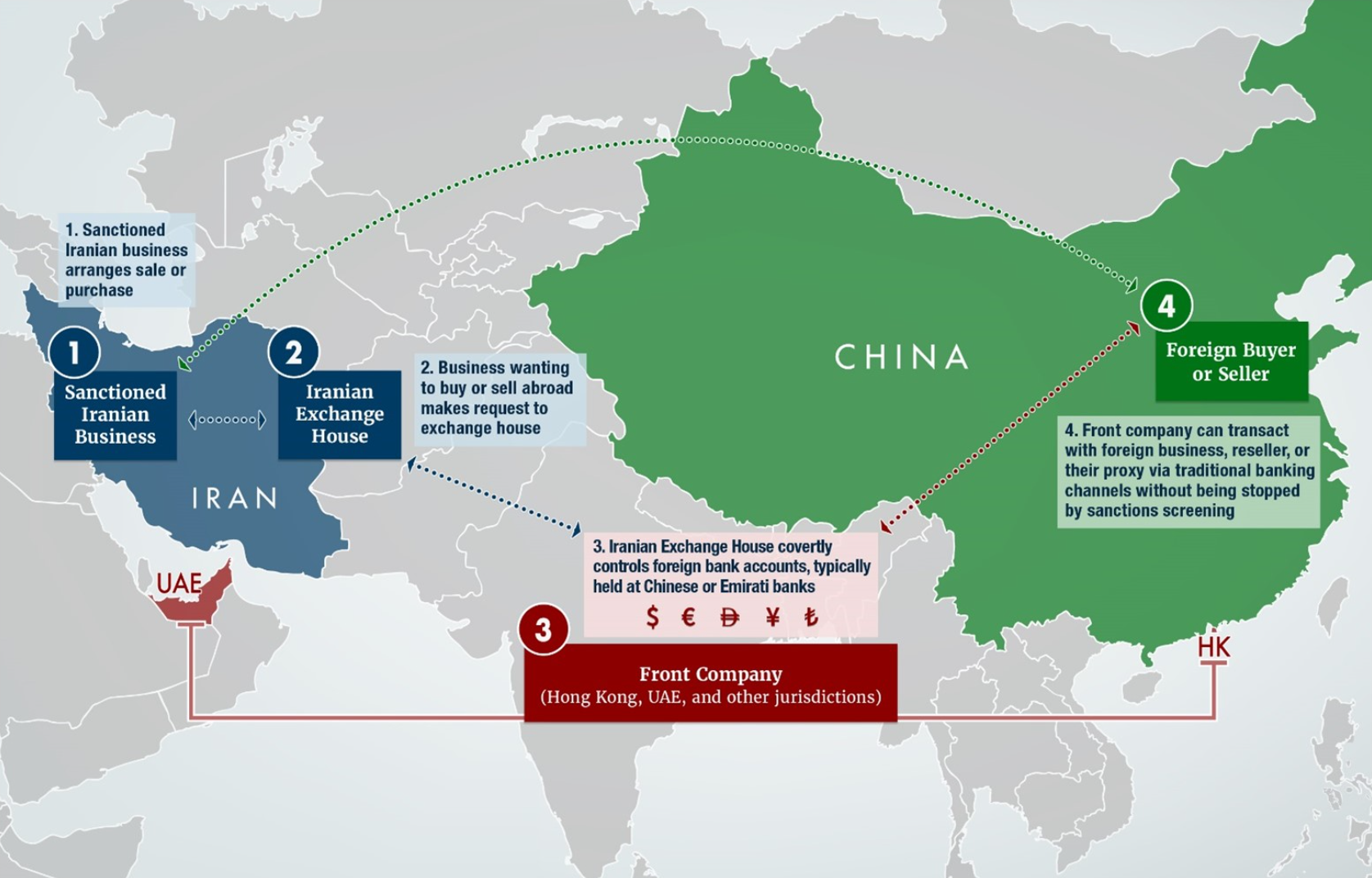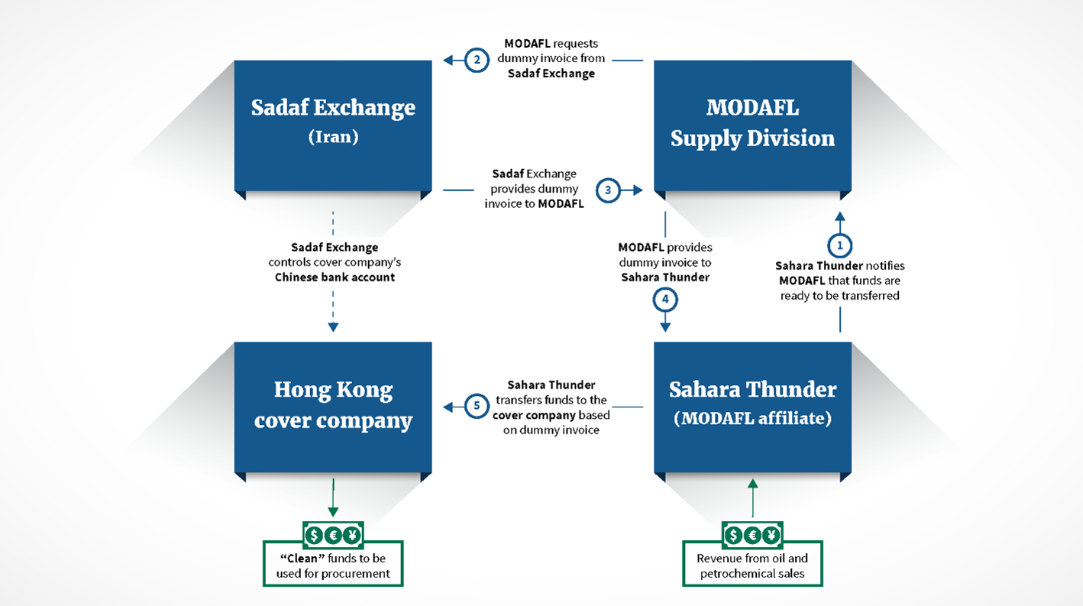Out of the Shadows
The Mechanics of Iran’s Shadow Banking System
📅 July 23, 2025
📅 July 23, 2025
The U.S. Treasury Department has released successive sanctions tranches aimed at reducing Iran’s illicit oil exports and weakening the financial networks that support the Iranian Revolutionary Guards Corps (IRGC), Ministry of Defense and Armed Forces Logistics (MODAFL), and affiliated militia groups. As detailed in FinCEN’s June 2025 Advisory, these efforts include targeting individuals and entities across Iran, Hong Kong, the UAE, Türkiye, and other jurisdictions involved in operating and facilitating Iran’s ‘shadow banking’ system used to evade sanctions.
At its core, the shadow banking system operates as a parallel financial infrastructure that relies on opaque money exchange houses. Iran’s overall revenue generating scheme involves an array of front companies and legitimate businesses, spanning across jurisdictions and sectors, and yields billions of dollars for the state and its proxies.
While there is no single blueprint for how Iran raises funds through illicit oil sales, the process generally follows a similar pattern:
At the root of the oil smuggling scheme is the National Iranian Oil Company (NIOC), Iran’s state-owned oil production giant. The NIOC grants the IRGC and MODAFL a significant portion of crude oil stock, which they proceed to sell abroad independently to supplement their budgets.
Secondary sanctions risks dissuade most refineries from purchasing crude oil originating from the NIOC. To get around the restrictions, Iranian oil – now in the possession of the IRGC or MODAFL – is either fraudulently represented as being of foreign origin, or physically blended with foreign petroleum to disguise its chemical composition. The oil is often rebranded as a “Malaysian blend,” and Iraqi networks have emerged as an important vector in facilitating blending operations.
Once blended, front companies of the IRGC or MODAFL (often incorporated in Hong Kong, the UAE, Türkiye, or elsewhere) market the oil as being of purely Malaysian, Iraqi, Omani, or other origin, and sell it at a discounted rate to suitable buyers. Around 90% of customers are independent Chinese refineries, commonly referred to as teapot refineries.
The front companies that market the oil often handle shipping to the teapot refineries as well. Iran maintains a fleet of “older, poorly maintained vessels operating outside of standard maritime regulations,” which are used for oil shipments. Ship-to-ship transfers, automated identification system (AIS) obfuscation, the use of fraudulent documentation, and other tactics are used to evade international restrictions and reach the port of delivery.
After the refineries receive the shipment, the front companies are not paid directly. Rather, they inform their designated Iranian exchange of the sum of the payment and the originator of the transaction. These exchanges, which operate as wings of the financial departments of the NIOC, function as banks and control their own network of front companies known as “trusts” that hold accounts in foreign banks, often in China or the UAE. The exchange determines which trust needs to be credited and then instructs the shipping company to notify the refinery that it will receive an invoice (denominated in US dollars, euros, or Emirati dirham) from the trust. The payments are then deposited into the account of the trust and are cleaned for weapons procurement or other activities.
🚩 Red Flags Associated with Iranian Oil Shipments
🚩 Ship-to-Ship Transfers: Ship-to-ship (STS) transfers are the practice of transferring cargo from one vessel to another at sea rather than in port. While most STS transfers are legal, tankers transporting Iranian oil have conducted them to move petroleum to non-sanctioned vessels. Iran usually uses multiple STS transfers – often three to five – in a single shipment, which is a strong indicator of sanctions evasion.
🚩 AIS Manipulation or Disabling: AIS is a maritime navigation system designed to identify and locate vessels to avoid collisions that is now often used for tracking. Vessels or tankers carrying Iranian oil intentionally disable or alter AIS, Maritime Mobile Service Identity (MMSI), and other data to conceal their movement.
🚩 Fraudulent Documentation: Networks facilitating Iranian oil sales may manually falsify vessel and cargo documents, including bills of lading, certificates of origin, invoices, packing lists, proof of adequate insurance, lists of last ports of call, and others. The networks may also obtain new documentation in third jurisdictions with weak oversight to conceal an Iranian nexus.
For a full list of deceptive practices associated with Iranian oil shipping, see OFAC’s April 2025 Guidance.
At times, Iran will outsource the process entirely to third-party firms. For example, the IRGC has partnered with the Turkish-based and Gibraltar-incorporated ASB Group, controlled by the designated Turkish businessman Sitki Ayan, to establish relationships with foreign customers, coordinate shipping, and assisting in laundering the proceeds of oil smuggling.

In April 2024, OFAC sanctioned Sahara Thunder, the primary front company involved in facilitating the sale of unmanned aerial vehicles (UAVs) and overseeing all commercial activities for MODAFL. The firm managed illicit oil sales to raise funds for MODAFL and coordinated with Sadaf Exchange, based in Iran and operated by an Iranian-Turkish moneychanger, in a multi-step process to launder the proceeds and procure advanced weapons components on the international market.
After delivering oil to a refinery, Sahara Thunder would inform MODAFL that funds were ready to be transferred and request a dummy invoice from Sadaf Exchange. The exchange, which controlled the bank account of a trust at a Hong Kong financial institution, provided a dummy invoice from the trust to MODAFL, which then sent it to Sahara Thunder. Sahara Thunder passed the dummy invoice to the refinery, which subsequently transferred the funds to the trust’s account in Hong Kong.

While most Iranian oil smuggling and shadow banking typologies should already be incorporated into the internal controls of financial institutions, the evolving sophistication and multi-jurisdictional nature of Iran’s operations may make it more difficult to detect its obfuscation techniques. According to FinCEN’s Advisory published on June 6, 2025, a few red flags may be unique to Iran’s activities:
🚩 Transactions relate to oil, especially those originating from Southeast Asia and bound for China, referencing “Malaysian blend” oil.
🚩 Maritime databases indicate AIS irregularities or evidence of ship-to-ship transfers in Southeast Asia.
🚩 Petroleum or shipping companies conduct business with counterparties with ties to Iran, or transport goods using vessels with ties to Iran.
🚩 Transactions involve multiple exchange houses or general trading companies, adding additional fees and costs that do not reflect conventional commercial practices.
🚩 Exchange houses or trading companies in jurisdictions near Iran use forged documents to disguise the identities of parties involved in transactions.
🚩 General trading companies registered in free trade zones in the UAE hold bank accounts in multiple Emirati financial institutions and conduct business with companies located in Singapore and Hong Kong.
🚩 Middle Eastern companies with links to Iran or showing indications of being a front company receive payments primarily from petroleum companies, then make payments primarily to electronics companies based in Hong Kong and China.
Financial institutions should continue to review and integrate alerts and advisories from FinCEN and other authorities regarding Iranian activities into their financial crime compliance program. Proactive monitoring of red flags is essential to mitigate exposure to illicit financial activity.










 Blockchain & Ballistics
Blockchain & BallisticsThis site uses cookies. By continuing to browse the site, you are agreeing to our use of cookies.
Accept settingsHide notification onlySettingsWe may request cookies to be set on your device. We use cookies to let us know when you visit our websites, how you interact with us, to enrich your user experience, and to customize your relationship with our website.
Click on the different category headings to find out more. You can also change some of your preferences. Note that blocking some types of cookies may impact your experience on our websites and the services we are able to offer.
These cookies are strictly necessary to provide you with services available through our website and to use some of its features.
Because these cookies are strictly necessary to deliver the website, refusing them will have impact how our site functions. You always can block or delete cookies by changing your browser settings and force blocking all cookies on this website. But this will always prompt you to accept/refuse cookies when revisiting our site.
We fully respect if you want to refuse cookies but to avoid asking you again and again kindly allow us to store a cookie for that. You are free to opt out any time or opt in for other cookies to get a better experience. If you refuse cookies we will remove all set cookies in our domain.
We provide you with a list of stored cookies on your computer in our domain so you can check what we stored. Due to security reasons we are not able to show or modify cookies from other domains. You can check these in your browser security settings.
These cookies collect information that is used either in aggregate form to help us understand how our website is being used or how effective our marketing campaigns are, or to help us customize our website and application for you in order to enhance your experience.
If you do not want that we track your visit to our site you can disable tracking in your browser here:
We also use different external services like Google Webfonts, Google Maps, and external Video providers. Since these providers may collect personal data like your IP address we allow you to block them here. Please be aware that this might heavily reduce the functionality and appearance of our site. Changes will take effect once you reload the page.
Google Webfont Settings:
Google Map Settings:
Google reCaptcha Settings:
Vimeo and Youtube video embeds:
You can read about our cookies and privacy settings in detail on our Privacy Policy Page.
Privacy Policy